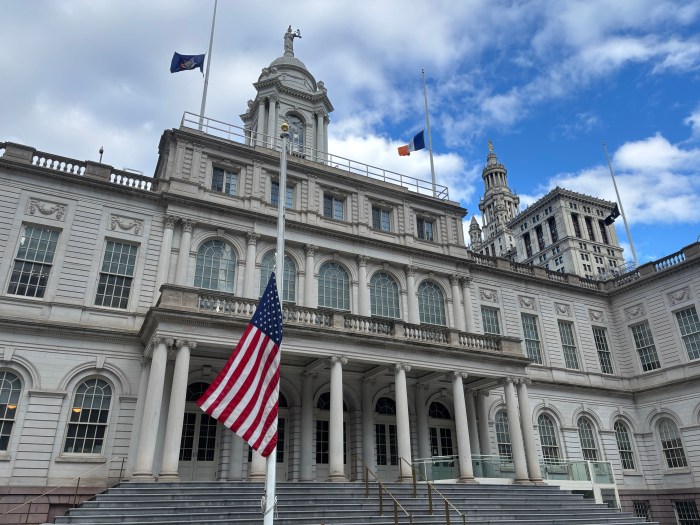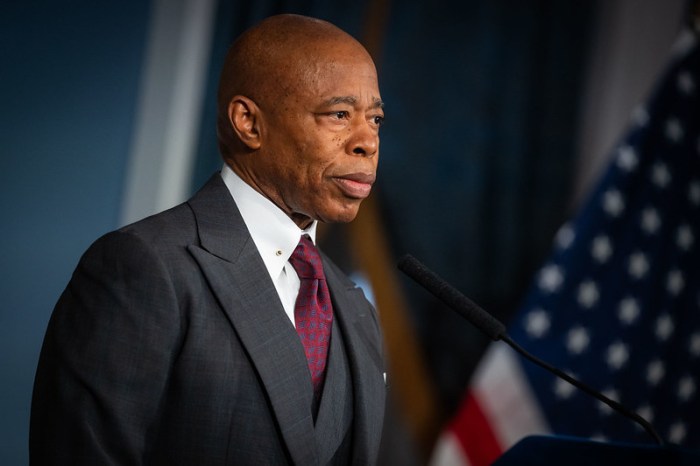BY PAUL SCHINDLER | Just shy of a week after New York marked the 15th anniversary of 9/11, the city was shaken by a bomb explosion in Chelsea. Though we issued a collective sigh of relief that there were no fatalities — and none in other terror episodes in New Jersey and Minnesota the same day — that’s not to minimize the pain and horror faced by the 31 people injured and the many more who experienced close calls. The New York Times described one of the victims having ball bearings removed from her body and splintered wood from her neck.
The barbarity of the attack is shocking.
When this kind of mayhem descends on us it’s almost instinctual to reach for a compellingly easy solution — if for no other reason than to keep our anxiety at bay.
EXPRESS OURSELVES
One ugly response in that vein is to strike out at Muslims in our midst and elsewhere. Donald Trump Jr., taking to Twitter on Monday, posted an image of candy with the legend, “If I had a bowl of skittles and I told you just three would kill you. Would you take a handful? That’s our Syrian refugee problem.” The message Trump tweeted along with the picture read, “This image says it all. Let’s end the politically correct agenda that doesn’t put America first. #trump2016.”
Of course, the image doesn’t say it all, and what it does say doesn’t even make sense. “We don’t know anything about them,” the young Trump’s father routinely says about refugees from Syria and other trouble spots, an assertion that flies in the face of the multi-year, cumbersome process they face in trying to enter the US. Even Wrigley, the owner of the Skittles brand, stepped up to decry the unseemliness of comparing refugees, many of them desperate, to a bowl of candy.
Ahmad Khan Rahami, the alleged Chelsea bomber, wasn’t a Syrian refugee. He came here from Afghanistan two decades ago and is a naturalized American citizen. He traveled several times in recent years to both Afghanistan and Pakistan, where his turn toward radicalism and terrorism may well have been encouraged, but it’s unclear at this moment whether he had any direct guidance from or collaboration with others, at home or abroad.
In other words, it may be that Rahami progressed to the point where he committed heinous acts of violence largely on his own; that he was for the most part a “homegrown” terrorist.
Trump Jr.’s dad, the Republican presidential nominee, offered little more in the way of a helpful prescription than young Don. Rejecting, this time, the word “weak” — a favorite of his — in describing President Barack Obama and by extension his Democratic presidential rival Hillary Clinton, Trump said the nation’s current leadership is “stupid.”
“In Israel they profile, they’ve done an unbelievable job, as good as you can do,” he argued. “They profile. They see somebody that is suspicious, they will profile, they will take that person in, they’ll check out. Do we have a choice? Look what’s going on? Do we really have a choice?”
But if the measure of a successful counterterrorism program is that we never have incidents like the Chelsea bombing, Israel is surely not doing “an unbelievable job.”
Leaving aside for a moment the ethics and efficacy of “profiling,” let’s consider whether it is even possible. Take the case of Rahami. He wasn’t profiled, but following a domestic violence arrest several years ago, the FBI, at the urging of his father, investigated him for terrorist leanings, but found no basis to hold him or dig deeper and his father reportedly recanted his concerns, explaining he was motivated by anger over the family upheaval. It’s easy in retrospect to suggest the inquiry did not go far enough, that more should have been done, but no specific evidence has surfaced indicating there were grounds at that time to devote scarce law enforcement and anti-terrorism resources to any further surveillance.
Trump’s statements about “weak” and “stupid” leadership suggest the government simply isn’t trying hard enough, but his solutions typically boil down to talking tougher and suggesting ever-more sweeping — but less targeted — crackdowns. Blunt approaches, in a world where choices need to be made, offer little promise of success.
And there is a cost — beyond the expenditure of resources and time. To the extent ISIS and other extremists are encouraging homegrown terrorism in Western countries, we are in a battle for hearts and minds. Stigmatizing people because of their religion, nationality, and/ or immigrant status is only counterproductive in that battle. That’s not political correctness, it’s smart thinking. And in the process, our constitutional guarantees are preserved.
Trump and his most devoted followers are not the only ones whose instincts lead them to easy but unhelpful solutions. The Times notes that Hillary Clinton has talked about targeting radical speech on the Internet but largely been dismissive of the tough questions that could emerge about what she termed “all the familiar complaints: ‘Freedom of speech.’”
Even some New Yorkers who otherwise took the Chelsea bombing reasonably in stride were quick on the trigger to complain about this political leader or that who didn’t rush to name the bombing “terrorism” even before the evidence was firmly in hand.
Ensuring absolute security in a democratic nation of 325 million people is a tall order, but compared to much of the rest of the world the US has been relatively fortunate in the 15 years since the devastating 9/11 attacks. Surely that means something. With violent radicalism still on the rise worldwide, we need to be steady in our resolve but patient and wise in resisting cheap appeals to our fears. We should not be terrorized into abandoning our ideals while shooting ourselves in the foot.



































